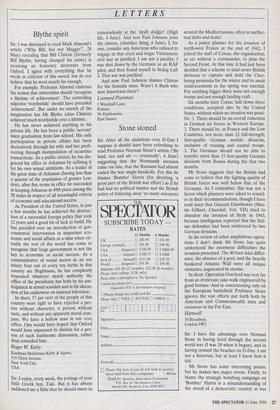LETTERS Blythe spirit
Sir: I was dismayed to read Mark Almond's article ('Why Bill, but not Maggie?', 28 May) revealing that Bill Clinton (formerly Bill Blythe, having changed his name) is receiving an honorary doctorate from Oxford. I agree with everything that he wrote in criticism of this award, but do not believe that he went nearly far enough.
For example, Professor Almond endorses the notion that universities should 'recognise a lifetime of achievement'. The controlling adjective 'worthwhile' should have preceded `achievement'. But under no stretch of the imagination has Mr Blythe (alias Clinton) achieved much worthwhile over a lifetime.
He has never achieved anything in his private life. He has been a public 'servant' since graduation from law school. His only participation in private affairs has been derivatively through his wife and her profi- teering through manipulation of securities transactions. As a public citizen, he has dis- graced his office in Arkansas by utilising it for his own sexual ambitions. As a leader of the great state of Arkansas (having less than a quarter of the population of greater Lon- don), after five terms in office he succeeded in keeping Arkansas in 49th place among the 50 states in respect of all meaningful criteria of economic and educational success.
As President of the United States, in just a few months he has achieved the destruc- tion of a successful foreign policy that took 12 years and a good bit of luck to build. He has presided over an introduction of gov- ernmental intervention in important eco- nomic and social affairs at a time when vir- tually the rest of the world has come to recognise that large government is not the key to economic or social success. As a communicator of social mores in an era where four out of every ten births in this country are illegitimate, he has completely evacuated whatever moral authority the office of the presidency has both by his par- ticipation in sexual scandals and in his discus- sion of his underwear on national television.
In short, 57 per cent of the people of this country were right to have rejected a per- son without character, a person without taste, and without any apparent moral com- pass. We have a hollow man in our core office. One would have hoped that Oxford would have expressed its disdain for a per- son of such loathsome dimension, rather than rewarded him.
Roger W. Kirby
Kaufman Malchman Kirby & Squire, 319 Third Avenue, New York City, USA


































































 Previous page
Previous page